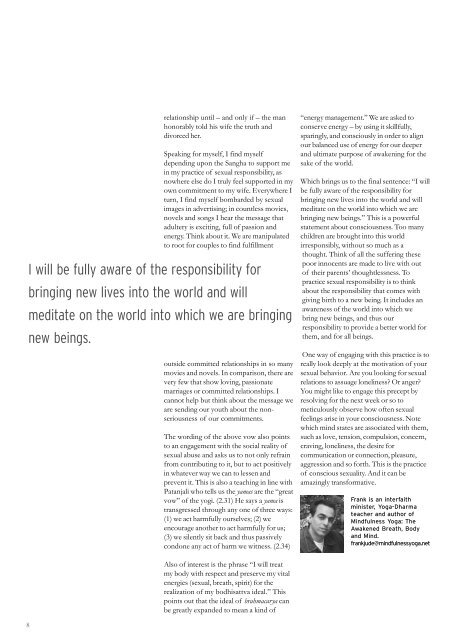Create successful ePaper yourself
Turn your PDF publications into a flip-book with our unique Google optimized e-Paper software.
elationship until – and only if – the man<br />
honorably told his wife the truth and<br />
divorced her.<br />
Speaking for myself, I find myself<br />
depending upon the Sangha to support me<br />
in my practice of sexual responsibility, as<br />
nowhere else do I truly feel supported in my<br />
own commitment to my wife. Everywhere I<br />
turn, I find myself bombarded by sexual<br />
images in advertising; in countless movies,<br />
novels and songs I hear the message that<br />
adultery is exciting, full of passion and<br />
energy. Think about it. We are manipulated<br />
to root for couples to find fulfillment<br />
I will be fully aware of the responsibility for<br />
bringing new lives into the world and will<br />
meditate on the world into which we are bringing<br />
new beings.<br />
outside committed relationships in so many<br />
movies and novels. In comparison, there are<br />
very few that show loving, passionate<br />
marriages or committed relationships. I<br />
cannot help but think about the message we<br />
are sending our youth about the nonseriousness<br />
of our commitments.<br />
The wording of the above vow also points<br />
to an engagement with the social reality of<br />
sexual abuse and asks us to not only refrain<br />
from contributing to it, but to act positively<br />
in whatever way we can to lessen and<br />
prevent it. This is also a teaching in line with<br />
Patanjali who tells us the yamas are the “great<br />
vow” of the yogi. (2.31) He says a yama is<br />
transgressed through any one of three ways:<br />
(1) we act harmfully ourselves; (2) we<br />
encourage another to act harmfully for us;<br />
(3) we silently sit back and thus passively<br />
condone any act of harm we witness. (2.34)<br />
“energy management.” We are asked to<br />
conserve energy – by using it skillfully,<br />
sparingly, and consciously in order to align<br />
our balanced use of energy for our deeper<br />
and ultimate purpose of awakening for the<br />
sake of the world.<br />
Which brings us to the final sentence: “I will<br />
be fully aware of the responsibility for<br />
bringing new lives into the world and will<br />
meditate on the world into which we are<br />
bringing new beings.” This is a powerful<br />
statement about consciousness. Too many<br />
children are brought into this world<br />
irresponsibly, without so much as a<br />
thought. Think of all the suffering these<br />
poor innocents are made to live with out<br />
of their parents’ thoughtlessness. To<br />
practice sexual responsibility is to think<br />
about the responsibility that comes with<br />
giving birth to a new being. It includes an<br />
awareness of the world into which we<br />
bring new beings, and thus our<br />
responsibility to provide a better world for<br />
them, and for all beings.<br />
One way of engaging with this practice is to<br />
really look deeply at the motivation of your<br />
sexual behavior. Are you looking for sexual<br />
relations to assuage loneliness? Or anger?<br />
You might like to engage this precept by<br />
resolving for the next week or so to<br />
meticulously observe how often sexual<br />
feelings arise in your consciousness. Note<br />
which mind states are associated with them,<br />
such as love, tension, compulsion, concern,<br />
craving, loneliness, the desire for<br />
communication or connection, pleasure,<br />
aggression and so forth. This is the practice<br />
of conscious sexuality. And it can be<br />
amazingly transformative.<br />
Frank is an interfaith<br />
minister, Yoga-Dharma<br />
teacher and author of<br />
Mindfulness Yoga: The<br />
Awakened Breath, Body<br />
and Mind.<br />
frankjude@mindfulnessyoga.net<br />
Also of interest is the phrase “I will treat<br />
my body with respect and preserve my vital<br />
energies (sexual, breath, spirit) for the<br />
realization of my bodhisattva ideal.” This<br />
points out that the ideal of brahmacarya can<br />
be greatly expanded to mean a kind of<br />
8

















